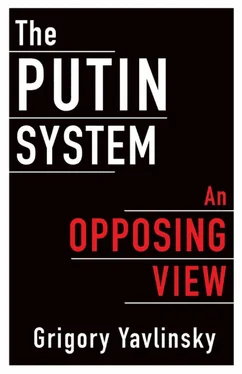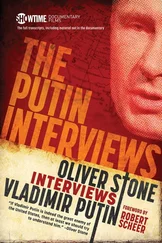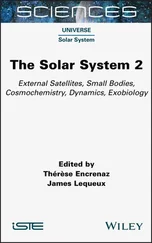futures of political systems, predictability of, 136–45; historians’ revised thinking on, 137–41
globalization, and attraction of West for global elite, 105
Gusinsky, Vladimir, 67
human rights, Russian drift toward totalitarian state and, 163, 165
Huntington, Samuel, 212n1
ideology: authoritarian systems’ lack of, 85, 86–88, 160–61; in competition-based systems, 85, 86; risks of formulating, 161; role in countries’ ability to compete globally, 177–78; in totalitarian systems, 85, 86
ideology of Russian government: 1990s reform ideology, 88; control of financial flows as substitute for, 90; lack of, in 2000s, 88–90, 161, 197
ideology of Russian government in 2010s, 90–100; on bond of people and government, 161–62; casting of opposition to ruling elite as destructive fifth column, 92–93, 195; clannish, premodern tone of, 187; conflation of ruling elite with state itself, 38, 48, 91–92, 197, 210n6; emphasis on traditional values, 97–98, 135, 161–62, 163, 197; and Eurasianist values, 165–66; and government as product of national spirit, 163–64; on hostile West as primary source of Russian problems, 93–96, 162, 165, 195, 198–99, 210–11n7; and hostility to minorities, 97–100, 166; ideological uses of Russian pride, 96–97; increasing reliance on, 197–99; intellectual bankruptcy of, 188; as mix of past ideologies, 163, 212n5; obligatory compliance with, 162–63, 164; reasons for resurgent interest in, 90–91, 100, 161, 211n8; risks of, 100–101, 162, 166–67; on Russian mission of benevolent empire, 198; and Russian nationalism, 163, 165, 180, 198; as sign of declining confidence of regime, 162; spread by institutions, 198–99; as top-down imposition, 199; and transition to totalitarian state, 162–63; xenophobia in, 162, 165, 197
institutions: important functions of, 123–25; as keeper of norms and rules, 129–30; of peripheral economies, lack of full development in, 175
institutions in authoritarian regimes: difficulty of developing competitive-based system from, 176; important functions of, 124–26; as instruments of rulers’ will, 129–30
institutions in Russia: adequate, failure to create, 189; corrupt practices taking place of, 189–90; demodernizing influence of, 190; instability of, 130; lag behind developmental needs, 44–45; purging of “troublemakers” from, 164–65
institutions in Russia, weakness of, 30–32, 40, 41–42, 125–31; costs of, 127–28; as drag on economic development, 44–45, 130–31; and increasing irrelevance, 166–67
intelligentsia, role in supporting Russian authoritarianism, 209–10n1
international relations: as amoral contest for power, 139–40; and multiple civilizations theory, 138–39; and Russian casting of opposition to ruling elite as fifth column, 93. See also isolationism of Russia; West, Russian confrontation with
international view of Russia: Chechnya war and, 37–38; and legitimacy granted by elections, 79; Russia’s lack of interest in, 202–3
internet, and criticism of rulers, 209n1
investments in Russia, limited opportunity and high risk of, 104–5
Islam, militant, Russia’s views on, 94, 95
isolationism of Russia: and ceding of voice in world affairs, 178–79; as dangerous misdirection, 185–86; and descent into parochialism, 178–81; and diminishing economic opportunities, 183; economic effects of, 172, 173; increases in, 146, 149–50, 153–54, 173, 195; and lack of interest in Western perceptions, 202–3; laws forbidding foreign assets for Russian officials, 70–71, 106, 154, 174; and outside organizations, increased restrictions on, 202; and potential for implosion, 181; and protection of authoritarian rule, 195; Russia’s ability to neutralize international influences, 134
judicial system, Russian: ineffectiveness of, 31, 40, 56, 128–29; instability of, 130; media attacks on, 49
Khodorkovsky, Mikhail, 58–59, 67–68, 208n11
law in Russia: as instrument of rule, 111, 133, 211n9. See also rule of law in Russia
Lebed, Alexander, 34
legislature: and corruption, 103–4; costs of delegitimation of, 127–28, 211–12n13; decaying effectiveness in 2000s, 56; elimination of political opposition and, 169–70; Kremlin control of, 126–27; lack of real power in 1990s, 31, 40; media efforts to undermine, 49; Yeltsin’s disbanding of (1993), 31, 37, 168
Libya, and tensions between Russia and West, 148
loans-for-shares auctions, 34, 38, 51
lower classes: role of, in countries of near vs. distant periphery, 115–16; in Russia, and social support of government, 118
Luzhkov, Yuri, 39
market reforms, Russian public’s disappointment with, 88–89
media, global, Russia’s inability to influence, 181
media, Russian: attacks on legislature’s authority, 49; and changing social support of government, 121–22; control of information agenda, 72, 133–34, 209–10n1; coverage of 2018 election, 201; and Federal Assembly, criticisms of, 126; freedom allowed to non-political programming, 74; government control of, xviii, 14, 66–67, 71–75, 207–8n9; government tolerance of negligible fringe outlets online, 67; and hostility to minorities, 100; and instability of institutions, 130; lack of alternatives to status quo as central message of, 72–75; large incomes allowed to loyal managers of, 74; and movement toward totalitarian state, 164, 199; public’s skepticism about, 72; stoking of fears of external threat, 190; support for new Russian ideology, 162, 198; support for Russian parochialism, 178
media, Western, on Russia, ix, xi
Medvedev, Dmitry, 63, 145
military, Russian, economic impact of high spending on, 190–91
minorities: hostility toward, in new Russian ideology, 97–100, 166; Soviet policy of multiculturalism and, 98–99
nationalism, Russian: in ideology of Russian autocracy, 163, 165, 180, 198; on Russian mission of benevolent empire, 198
NATO, history of tensions with Russia, 147
natural resources in Russia: elite’s belief in government ownership of, 119–21; elite’s seizure of control over, 57, 120. See also oil and gas revenues
natural resources in Russia, export of: as basis of economy, 7, 104–5, 181, 194; control of, as basis of elite’s power, 5, 119, 121, 151, 194–95, 207–8n9
neoliberalism, and weakening of Western institutions, xiii
oil and gas revenues: and consolidation of authoritarian regime, 119, 195, 207–8n9; control of, as basis of elite’s power, 121, 151, 194; as cushion against reform pressures, 59–60; elite’s seizure of control over, 120; and failure to develop diversified economy, 104–5, 194–95; as stabilizing influence on Russian economy, 5; and transition of social base into form characteristic of low-development countries, 119–20
oligarchs: illegitimacy of property ownership, 34, 38, 51, 58; lack of status as class, 57–59
parochialism, Russian descent into, 178–81; media support for, 178; and potential for implosion, 181
peripheral authoritarianism: dependence on core Western nations, 134–35; as inevitable result of peripheral economy, 174–75; institutions in, 125–26, 129–30; limited influence on international affairs, 176; and only currently-existing form of authoritarianism, 113; and patronage autocracy, 195; Russian system as, 133; social base of countries in near vs. distant economic periphery, 115–16; value of designation for analysis of Russia, 113–15; wide variations in economies of, 113–14. See also authoritarian system(s)
peripheral authoritarianism of Russia, 17; characteristics of, 133–35, 194; corporatism of, 122–23; current neo-totalitarian stage of, 84, 146, 162–63; development of, in 1990s, 16, 32–37, 39, 41–42, 135–36, 167–68; elites’ contentment with, 178–79; as inevitable loser in global economic competition, 184–85; as political postmodernism, 112, 188–89, 201; preservation of rent incomes as central goal of, 65; public’s tacit acceptance of, 39, 48; relative freedom allowed to depoliticized individuals, 36; repetition of historical flaws in Russia government, 45–46; weak institutions characteristic of, 130–31. See also future of Russian autocracy; political system in Russia; reform of Russian system
Читать дальше












